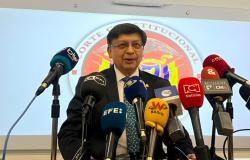The head of the European Commission, Ursula von der Leyen, yesterday began trying to form a coalition after the extreme right gained weight in the elections to the European Parliament, which led the president of France, Emmanuel Macron, to call a vote early national.
A shift to the right within the European Parliament may make it difficult to pass new legislation to respond to security challenges, the impact of climate change or industrial competition from China and the United States.
A slim majority
Von der Leyen, German president of the powerful executive body of the European Union, emerged strengthened from the elections held on Sunday in 27 countries, as her center-right European People’s Party (EPP) gained seats. But to secure a second five-year term, von der Leyen needs the support of the majority of EU national leaders and a working majority in the European Parliament.
Monday’s provisional results gave the main parties that supported Von der Leyen last time – the EPP, the Socialists and the Liberals – a total of 402 seats in the 720-member chamber. However, in Brussels it is considered too tight a majority.
Therefore, Von der Leyen could reach out to the Greens, who suffered heavy losses, and to the Italian nationalist prime minister, Giorgia Meloni, with whom she collaborated closely.
Rebuild
Late on Sunday night, Von der Leyen announced that she would begin by trying to rebuild the parliamentary foundations of her last term.
“I have been working on building a vast majority of pro-European forces. And that is why, starting tomorrow, we will reach out to the great political families with whom we have formed the platform”he declared to the press in Brussels.
Von der Leyen indicated that she would speak to others after those initial consultations, keeping her options open and specified that her goal is to work with those who are “pro-European, pro-Ukrainian and pro-rule of law.”
Spain, too
Spain’s centrist parties held off a far-right surge in Sunday’s European Parliament elections that is shaking governments in neighboring countries, helping to bolster Prime Minister Pedro Sánchez’s position as one of the center’s leading figures. European left.
The center-right Popular Party (PP) and Sánchez’s Socialists (PSOE) won two-thirds of the votes, up from about half in 2019, winning 42 of the 61 available seats.
Although the weight of the anti-immigration party Vox rose from 6.2% in 2019 to 9.6%, it fell compared to last year’s general elections, when it obtained 12.4%.
The advances of the far right were important elsewhere in Europe, and led President Emmanuel Macron in France to call early legislative elections, while the Social Democrats of German Chancellor Olaf Scholz suffered their worst historical result.
Sánchez’s leftist allies, Sumar, also lost ground, so the result represents a return to a two-party system after a decade of fragmented politics in Spain, analyzed Ignacio Molina, professor of Political Science at the Autonomous University of Madrid. “Spain is in good condition in the new European Parliament. It is the only member country whose two main parties are pro-European,” Molina explained to the Reuters news agency.
Alberto Núñez Feijóo’s PP gained ground with respect to last year’s general elections: his party gained one percentage point with respect to those elections.
Feijóo had asked that the EU elections be a plebiscite on Sánchez, criticized by some Spaniards for granting a controversial amnesty to Catalan separatists in exchange for parliamentary support for his candidacy for another term as president of the Government.
Feijóo commented that the PP’s results were the best in 25 years in Europe and stated that “every time the Popular Party has won a European election, it has won the following general elections.”
The euro and French stocks in a tailspin
The euro plummeted, while French bonds and stocks took a hit yesterday following French President Emmanuel Macron’s decision to call early parliamentary elections.
This came after the defeat the French president suffered against the far right in a European Union vote.
The euro fell by 0.5% to a one-month low of $1.0764 and against sterling at 84.53 pence over a 21-month period.
French blue chip stocks (.FCHI), fell by 2%, led by heavy losses at entities such as lenders such as BNP Paribas (BNPP.PA), and Société Générale (SOGN.PA), making the CAC 40 (.FCHI ), became the one with the worst results in Europe. The European benchmark index STOXX 600 (.STOXX) fell by 0.7%, according to information from the Reuters news agency.
French government bond prices also fell, pushing 10-year yields close to their highest level this year, around 3.19%.






